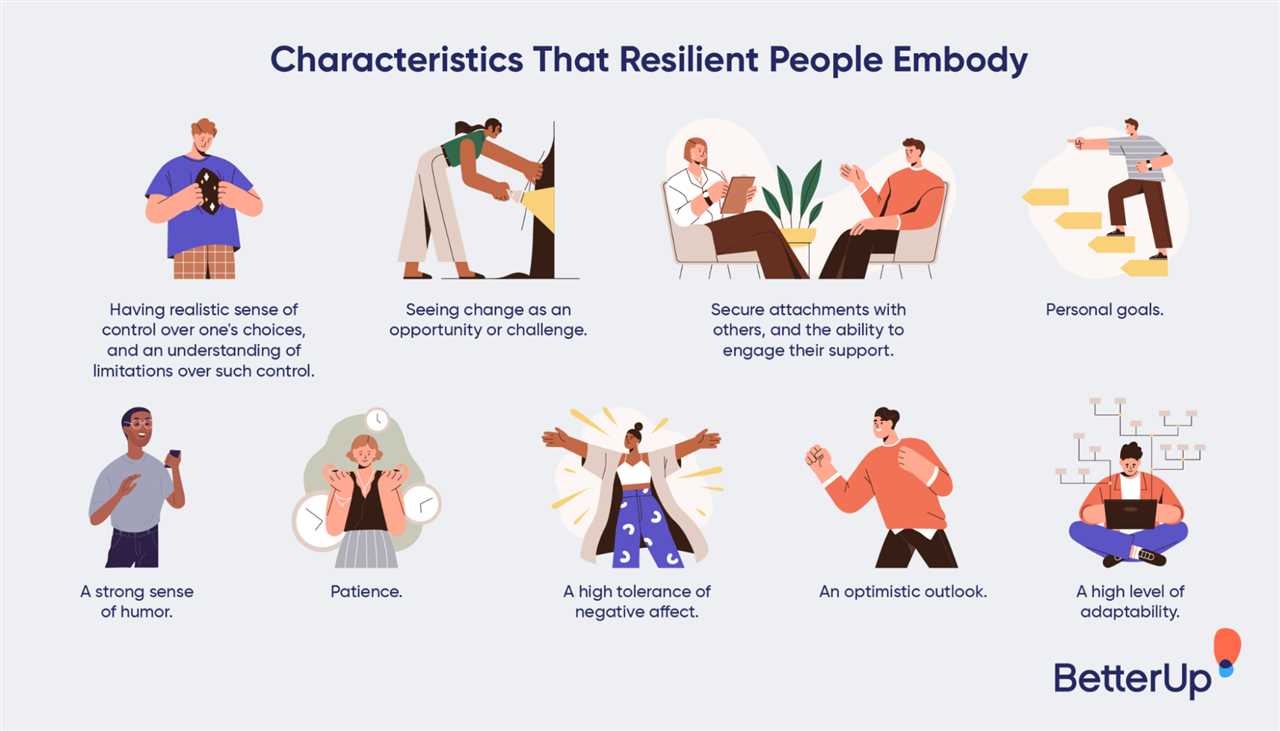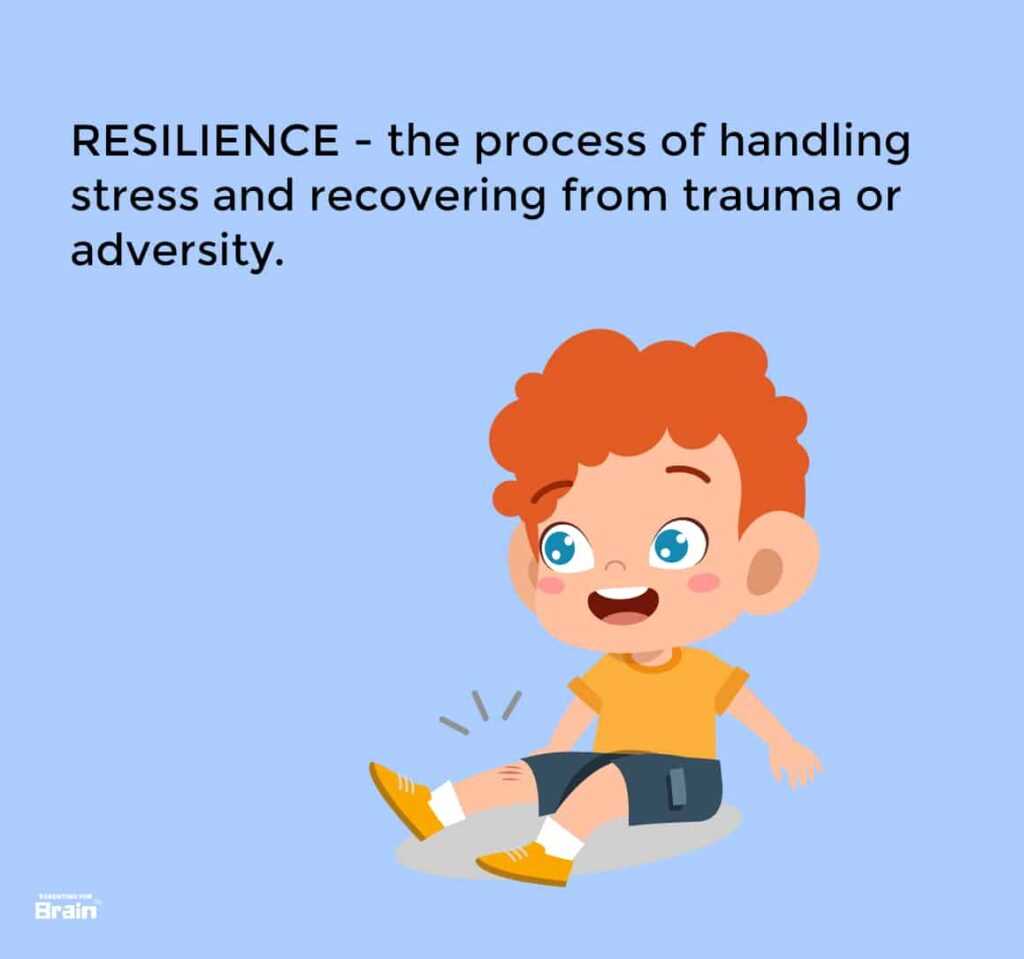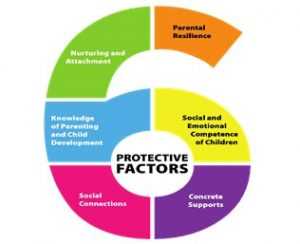
Stress is a common part of life, and everyone experiences it to some degree. However, not everyone reacts to stress in the same way. Some people seem to bounce back quickly, while others struggle to cope with even minor stressors. So, what makes someone more resilient to stress?
One factor is optimism. Research has shown that individuals with a positive outlook on life are better able to handle stress. Optimistic people tend to view challenges as temporary and solvable, which helps them maintain a sense of hope and motivation in the face of adversity.
Another important factor is adaptability. Resilient individuals are able to adjust their thoughts and behaviors to effectively deal with stressors. They are open to new ideas and perspectives, and are willing to change their approach if necessary. This flexibility allows them to find alternative solutions and move forward.
Mindfulness is also key to building resilience. Being mindful means being present in the moment and accepting one’s thoughts and feelings without judgment. This practice can help individuals develop a greater awareness of their stress triggers and learn to respond to them in a more calm and constructive manner.
Emotional intelligence is another trait that contributes to resilience. People with high emotional intelligence are able to recognize and understand their own emotions, as well as the emotions of others. This self-awareness and empathy allows them to effectively manage stress and maintain positive relationships, even in challenging situations.
Self-care is an essential component of resilience. Taking care of one’s physical, mental, and emotional well-being is crucial for managing stress. Engaging in activities that promote relaxation, such as exercise, meditation, and hobbies, can help individuals recharge and build their resilience reserves.
Coping skills also play a role in resilience. People who have developed healthy coping mechanisms, such as problem-solving, seeking social support, and practicing self-reflection, are better equipped to deal with stress. These strategies allow them to effectively navigate through difficult situations and bounce back more quickly.
While genetics and personality traits may contribute to a person’s baseline level of resilience, it is important to remember that resilience can be developed and strengthened over time. By cultivating optimism, adaptability, mindfulness, emotional intelligence, self-care, and coping skills, individuals can enhance their ability to bounce back from stress and thrive in the face of adversity.
Factors Affecting Resilience to Stress

Resilience is the ability to cope with and bounce back from stress and adversity. While everyone experiences stress, some individuals are more resilient than others. Several factors contribute to an individual’s level of resilience:
Coping: Effective coping strategies play a significant role in resilience. People who have healthy coping mechanisms, such as problem-solving skills, emotional regulation, and seeking social support, are more likely to handle stress effectively.
Self-care: Engaging in self-care activities, such as exercise, getting enough sleep, maintaining a balanced diet, and practicing relaxation techniques, can enhance resilience. Taking care of one’s physical and mental well-being helps build a strong foundation for managing stress.
Genetics: Genetic factors also play a role in determining an individual’s resilience. Some people may have a genetic predisposition towards resilience, making it easier for them to handle stress and bounce back from adversity.
Mindfulness: Practicing mindfulness, which involves being fully present in the moment and non-judgmentally observing one’s thoughts and feelings, can enhance resilience. Mindfulness helps individuals develop self-awareness and the ability to respond to stress in a more calm and adaptive manner.
Adaptability: Being adaptable and open to change is another factor that contributes to resilience. Individuals who can adjust their mindset and behavior to different situations are better equipped to handle stress and overcome challenges.
Personality: Certain personality traits, such as optimism, perseverance, and a sense of humor, are associated with higher levels of resilience. These traits help individuals maintain a positive outlook and find solutions to problems, even in the face of adversity.
Emotional intelligence: Emotional intelligence, which involves the ability to recognize and manage one’s own emotions and understand the emotions of others, is linked to resilience. Individuals with high emotional intelligence can effectively navigate stressful situations and maintain healthy relationships.
Support: Having a strong support network, including family, friends, and professional support, is crucial for building resilience. Social support provides individuals with a sense of belonging, emotional validation, and practical assistance, all of which contribute to their ability to cope with stress.
In conclusion, resilience to stress is influenced by a combination of factors, including coping strategies, self-care practices, genetics, mindfulness, adaptability, personality traits, emotional intelligence, and social support. By understanding and developing these factors, individuals can enhance their resilience and better manage stress in their lives.
Biological Factors

When it comes to resilience to stress, biological factors play a significant role. These factors include both genetic and physiological aspects that can influence an individual’s ability to cope with and adapt to stressful situations.
One biological factor that contributes to resilience is mindfulness. Mindfulness refers to the practice of being fully present and aware of one’s thoughts, feelings, and sensations in the present moment. Research has shown that individuals who engage in regular mindfulness practices are better able to manage stress and recover from it more quickly.
Another biological factor is the presence of a strong support system. Having a network of supportive relationships can provide individuals with the emotional and practical support they need to navigate stressful experiences. This support can help buffer the negative effects of stress and increase resilience.
Self-care is also an important biological factor in resilience. Engaging in activities that promote physical and mental well-being, such as exercise, healthy eating, and adequate sleep, can enhance an individual’s ability to cope with stress. Taking care of oneself allows for better emotional regulation and overall resilience.
Personality traits, such as optimism and adaptability, also play a role in biological factors of resilience. Optimistic individuals tend to have a positive outlook on life and are better able to see challenges as opportunities for growth. Adaptability allows individuals to adjust their responses to stress and change their coping strategies as needed.
Lastly, emotional intelligence is a biological factor that contributes to resilience. Emotional intelligence refers to the ability to recognize and understand one’s own emotions and the emotions of others. Individuals with high emotional intelligence are better able to manage stress, communicate effectively, and maintain positive relationships.
All of these biological factors can interact and influence an individual’s resilience to stress. By understanding and nurturing these factors, individuals can enhance their ability to cope with and bounce back from challenging situations.
Genetics
Genetics play a significant role in determining an individual’s resilience to stress. Some people are naturally more adaptable and better equipped to handle stressful situations due to their genetic makeup.
Research has shown that certain genetic factors can influence an individual’s emotional intelligence, coping mechanisms, and overall resilience. For example, individuals with specific gene variants may have a higher capacity for emotional regulation, allowing them to effectively manage stress and bounce back from adversity.
Optimism, another key factor in resilience, can also be influenced by genetics. Some individuals may have a genetic predisposition towards a positive outlook, enabling them to maintain a hopeful mindset even in challenging circumstances.
Additionally, genetics can impact an individual’s ability to seek and receive support. Some individuals may be more inclined to reach out to others for help and have a stronger support network, which can greatly enhance their resilience.
Self-care practices, such as exercise, adequate sleep, and healthy eating, are also influenced by genetics. Certain genetic variations may make it easier for individuals to prioritize and engage in self-care activities, which can bolster their resilience in the face of stress.
Personality traits, which are partially influenced by genetics, can also contribute to resilience. For example, individuals with a more optimistic and proactive personality may be better equipped to handle stress and navigate challenging situations.
While genetics can play a significant role in resilience, it’s important to note that it is not the sole determining factor. Environmental factors, such as childhood experiences and social support, also play a crucial role in shaping an individual’s ability to cope with stress. Nevertheless, understanding the genetic factors that contribute to resilience can provide valuable insights for developing effective strategies and interventions to enhance individuals’ ability to manage stress.
Physical Health

Physical health plays a crucial role in an individual’s resilience to stress. It encompasses several factors, including genetics, coping mechanisms, social support, mindfulness, adaptability, emotional intelligence, personality traits, and optimism.
Genetics can influence an individual’s physical health and their ability to handle stress. Some people may have a genetic predisposition to certain health conditions that can affect their resilience. However, it is important to note that genetics is just one aspect and does not determine a person’s ability to cope with stress entirely.
Coping mechanisms are another important factor in physical health and resilience to stress. Individuals who have effective coping strategies, such as exercise, meditation, or engaging in hobbies, tend to have better physical health outcomes. These coping mechanisms help reduce the negative impact of stress on the body and promote overall well-being.
Social support also plays a significant role in physical health and resilience. Having a strong support system, such as family and friends, can provide emotional and practical assistance during stressful situations. This support can help individuals better manage stress and maintain their physical health.
Mindfulness and adaptability are essential qualities that contribute to physical health and resilience. Mindfulness practices, such as meditation or deep breathing exercises, can help individuals stay present and focused, reducing the impact of stress on the body. Additionally, being adaptable and open to change allows individuals to navigate stressful situations more effectively and maintain physical well-being.
Emotional intelligence and personality traits also influence an individual’s physical health and resilience to stress. People with high emotional intelligence can effectively manage their emotions and navigate stressful situations more effectively. Additionally, certain personality traits, such as optimism and a positive outlook, can contribute to better physical health outcomes and increased resilience.
In conclusion, physical health is a crucial factor in an individual’s resilience to stress. Genetics, coping mechanisms, social support, mindfulness, adaptability, emotional intelligence, personality traits, and optimism all play a significant role in maintaining physical well-being and effectively managing stress.
Neurobiology

The neurobiology of resilience to stress is a complex and fascinating area of study. Various factors contribute to an individual’s ability to cope with and bounce back from stressful situations. These factors include personality traits, social support, genetics, self-care practices, adaptability, optimism, and emotional intelligence.
Personality plays a significant role in resilience. People with certain traits, such as high levels of conscientiousness and extraversion, tend to be more resilient to stress. They are better able to manage their emotions and find effective ways to cope with challenging situations.
Social support is another crucial factor in building resilience. Having a strong network of friends, family, and mentors can provide emotional support and practical assistance during times of stress. Knowing that there are people who care and are willing to help can greatly enhance an individual’s ability to bounce back.
Genetics also play a role in resilience. Some individuals may have genetic variations that make them more resilient to stress. These genetic factors can influence the functioning of the brain’s stress response system, making it easier for individuals to adapt and recover from stressful experiences.
Self-care practices are essential for maintaining resilience. Engaging in activities that promote physical and mental well-being, such as exercise, meditation, and hobbies, can help reduce stress levels and improve overall resilience.
Adaptability is another key factor. Resilient individuals are often flexible and able to adapt to new situations and challenges. They have a positive attitude towards change and are open to learning and growing from their experiences.
Optimism plays a significant role in resilience. Having a positive outlook and believing in one’s ability to overcome challenges can help individuals navigate stressful situations more effectively. Optimistic individuals are more likely to see setbacks as temporary and are better able to find solutions and move forward.
Emotional intelligence, or the ability to understand and manage one’s emotions, is also closely linked to resilience. Individuals with high emotional intelligence can recognize and regulate their emotions, which helps them navigate stressful situations more effectively and maintain a sense of control.
Overall, the neurobiology of resilience to stress is a multifaceted field that encompasses various factors. Understanding these factors can help individuals develop strategies to enhance their resilience and better cope with stress.
Psychological Factors

Psychological factors play a significant role in determining an individual’s resilience to stress. These factors include optimism, mindfulness, self-care, support, adaptability, emotional intelligence, personality, and coping strategies.
Optimism: Optimistic individuals tend to have a positive outlook on life and believe in their ability to overcome challenges. This mindset helps them cope with stress more effectively.
Mindfulness: Being mindful involves being fully present and aware of one’s thoughts, feelings, and sensations. It allows individuals to better manage stress by reducing rumination and increasing self-compassion.
Self-care: Taking care of oneself physically, mentally, and emotionally is crucial for building resilience. Engaging in activities that promote relaxation, exercise, and healthy eating can help individuals manage stress more effectively.
Support: Having a strong support system, whether it be friends, family, or a community, can provide individuals with the emotional and practical support they need during stressful times.
Adaptability: Resilient individuals are able to adapt to changing circumstances and find alternative solutions to problems. They are flexible and open-minded, which helps them navigate through stressful situations more effectively.
Emotional intelligence: Emotional intelligence refers to the ability to recognize and understand one’s own emotions and the emotions of others. Individuals with high emotional intelligence are better equipped to manage stress and build resilience.
Personality: Certain personality traits, such as optimism, self-confidence, and a sense of humor, can contribute to resilience. These traits enable individuals to approach stressful situations with a positive attitude and a belief in their ability to overcome challenges.
Coping strategies: Effective coping strategies, such as problem-solving, seeking social support, and practicing relaxation techniques, help individuals manage stress and build resilience.
Coping Mechanisms
When it comes to dealing with stress, individuals rely on various coping mechanisms to help them navigate challenging situations. These coping mechanisms can be influenced by a person’s personality, level of optimism, support system, adaptability, emotional intelligence, self-care practices, and mindfulness.
Personality plays a crucial role in determining how individuals cope with stress. Some people are naturally more resilient and have a tendency to view stressful situations as challenges rather than threats. This positive outlook enables them to approach stress with a problem-solving mindset, seeking solutions and opportunities for growth.
Optimism is another factor that contributes to resilience. Optimistic individuals tend to believe that they have the ability to overcome obstacles and find positive outcomes in difficult situations. This mindset allows them to maintain hope and motivation, even in the face of adversity.
A strong support system can also enhance an individual’s ability to cope with stress. Having friends, family, or mentors who provide emotional support, guidance, and encouragement can significantly reduce the impact of stress. Supportive relationships offer a sense of belonging and create a safe space for individuals to express their emotions and seek advice.
Adaptability is another important factor in building resilience. Being able to adapt to change and embrace uncertainty can help individuals navigate stressful situations more effectively. Flexibility and openness to new experiences enable individuals to adjust their expectations and find alternative solutions when faced with unexpected challenges.
Emotional intelligence, or the ability to recognize and manage one’s emotions, is also linked to resilience. Individuals with high emotional intelligence can effectively regulate their emotions, communicate their needs, and empathize with others. This emotional self-awareness and empathy can help individuals navigate stress and maintain healthy relationships, both of which are crucial for resilience.
Self-care practices are essential for building resilience and coping with stress. Engaging in activities that promote physical, mental, and emotional well-being, such as exercise, meditation, hobbies, and spending time with loved ones, can help individuals recharge and reduce the negative impact of stress.
Mindfulness, or the practice of being fully present in the moment without judgment, is another coping mechanism that can enhance resilience. Mindfulness allows individuals to observe their thoughts and emotions without becoming overwhelmed by them. This practice can help individuals develop a greater sense of self-awareness, reduce stress levels, and improve their ability to respond to challenging situations.
In conclusion, coping mechanisms play a significant role in determining an individual’s resilience to stress. Factors such as personality, optimism, support, adaptability, emotional intelligence, self-care practices, and mindfulness all contribute to an individual’s ability to navigate and overcome stressful situations.
Self-Efficacy
Self-efficacy is an important factor that contributes to an individual’s resilience to stress. It refers to one’s belief in their ability to successfully navigate and cope with challenging situations. People with high self-efficacy tend to have a strong sense of self and confidence in their abilities, which allows them to approach stressful situations with a positive mindset.
Self-efficacy is closely linked to self-care, as individuals who believe in their ability to take care of themselves are more likely to engage in healthy behaviors and practices that promote well-being. This includes activities such as regular exercise, getting enough sleep, and maintaining a balanced diet.
Optimism is another trait that is associated with self-efficacy and resilience to stress. Optimistic individuals tend to have a positive outlook on life and believe that they can overcome challenges. This mindset helps them to remain hopeful and motivated even in the face of adversity.
Coping strategies also play a role in self-efficacy. Individuals with high self-efficacy are more likely to use effective coping mechanisms when faced with stress. They are able to identify and utilize healthy strategies such as problem-solving, seeking social support, and practicing relaxation techniques. This allows them to effectively manage stress and bounce back from difficult situations.
Emotional intelligence is another important factor related to self-efficacy. People with high emotional intelligence are better able to understand and regulate their emotions, which can help them cope with stress more effectively. They are able to identify and express their emotions in a healthy way, as well as empathize with others, which can contribute to a strong support system.
Mindfulness and adaptability are also associated with self-efficacy. Mindfulness involves being fully present in the moment and accepting things as they are, which can help individuals better cope with stress. Adaptability refers to the ability to adjust and respond to change, which is crucial in navigating stressful situations.
Personality traits also play a role in self-efficacy. Individuals with high self-efficacy often possess traits such as resilience, determination, and a positive outlook. These traits enable them to persevere in the face of adversity and maintain a belief in their ability to overcome challenges.
Lastly, having a strong support system is important for self-efficacy and resilience to stress. Having people who believe in and support an individual’s abilities can boost their self-confidence and provide a sense of security during difficult times. This support can come from friends, family, or professionals such as therapists or mentors.
In conclusion, self-efficacy is a crucial factor that contributes to an individual’s resilience to stress. It encompasses various aspects such as self-care, optimism, coping strategies, emotional intelligence, mindfulness, adaptability, personality traits, and support systems. Developing and nurturing self-efficacy can help individuals better navigate and cope with stressful situations, leading to improved overall well-being.

I am Patrina de Silva, a psychologist and mental health blogger in Sri Lanka. After obtaining psychology degrees from the University of Colombo and Monash University, I returned home to work as a counselor while also starting the popular blog “Pressy but Happy” to provide advice on psychological issues. Over the past decade, my empathetic articles have made my blog a leading mental health resource in the country. In addition to writing, I maintain a private therapy practice, frequently volunteer counseling time, and conduct seminars, driven by my passion for destigmatizing mental illness and educating the public on the mind-body connection. I strive to be an influential voice in my field through my compassionate approach.
